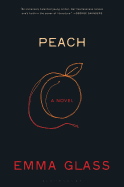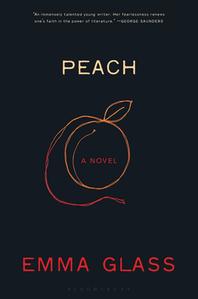
 Emma Glass is a research nurse specialist in London. Peach is her first novel, and it reveals an author already in fierce command of her own style. Like a bruised piece of fruit, it oozes with ruined sweetness that one can't wash off after reading. The novel's moral lessons stick, and they're meant to.
Emma Glass is a research nurse specialist in London. Peach is her first novel, and it reveals an author already in fierce command of her own style. Like a bruised piece of fruit, it oozes with ruined sweetness that one can't wash off after reading. The novel's moral lessons stick, and they're meant to.
The plot is straightforward: a British teen named Peach is sexually assaulted and must cope with the trauma. She placates the concerns of her parents, who believe she's just going through normal sexual feelings, and also indulges her nice but clueless boyfriend, Green. Unfortunately the trauma takes on a life of its own, and Peach's tender world begins an inward putrefaction.
Writing in the first-person, Glass revels in rhythmic fragments, rhyme and alliteration that create an uncanny stream-of-consciousness: "I stutter. I splutter.... My heart batters my lungs and my breath bursts out in little bullets. I want to tell him. I was taking care of Baby. Weak words." From Peach's perspective, the people in her life resemble food items. Her teacher is a blob of custard spraying students with saccharine goop. Her friend Spud is a lumpy, dirty potato. Her attacker is the walking embodiment of fatty sausage, leaving a residue of grease everywhere he goes.
Glass gives literal reality to these food-based characters--even their names designate their physicality and edibleness--but also makes them greater symbols of a consumer society. Different types of food lend themselves to different associations. Peach is a soft fruit everyone wants to squeeze and pinch. The attacker's meaty greasiness, on the other hand, stains everything with a revolting, pernicious quality. The novel makes surrealistic, dream-like leaps when nonliving objects also begin to resemble the food chain: "I watch cars roll in rows in the street on sushi wheels."
All this adds up to a macabre playfulness that keeps Peach lively and luridly engaging throughout. Glass's imaginative wordplay opens up the very serious subject matter of sexual assault in new, frightening dimensions. In the end, Peach becomes a fable on revenge that is viscerally, gut-wrenchingly delivered. The conclusion is gasp-inducing and points to vegetarianism as a form of redemption. The novel elicits an uncomfortable question: in a world in which we consume each other, what is justice?
Peach is a deceptively short, hugely provocative novel worth every bite. --Scott Neuffer, writer, poet, editor of trampset
Shelf Talker: This debut novel explores the trauma of sexual assault and lust for revenge through surreal and morbid imagery.

